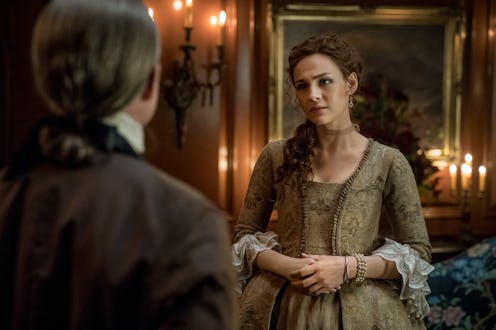Entertainment
This 'Outlander' Moment Highlights How Single Mothers — And Their Kids — Are Stigmatized

Spoilers ahead for Outlander Season 4, Episode 11. Now that Brianna is staying at her Aunt Jocasta's, she's experiencing firsthand how unwed pregnant women in the 1700s are perceived. It's because of these societal pressures that Brianna agrees to get married on Outlander, and it shows just how intense the stigma against unwed mothers was at the time.
In the Jan. 13 episode, Brianna is initially offended that her aunt has set up a dinner party to try and arrange a marriage for her, but she soon realizes she may have to go through with one — not for herself, but for her child. As Aunt Jocasta says, if her baby is born out of wedlock, "He'll be branded a fatherless bastard. His life will be ruined." And unfortunately, she has a point: according to Merriam Webster, the word "bastard" has been around since the 13th century, and has historically been used as an insult. Brianna, having been raised amid the sexual revolution of the '60s, isn't concerned about being a single mother, but is concerned with her child being treated differently because of it, and thus concludes she'll have to conform to the 18th century's antiquated standards.
Of course, Brianna is already technically handfasted to Roger, but Jamie and Claire may not be able to retrieve him from the Mohawk. And even if they do find him, she's concerned Roger won't want to become married in the eyes of the law, since there's a possibility the baby belongs to her rapist, Stephen Bonnet — yet another unfair concern she's forced to deal with, as it's hardly her fault she was assaulted. Ultimately, Brianna asks Lord John Grey to marry her, deciding it's worth sacrificing some of her own principles for the sake of her child.
Though Brianna's circumstances are complicated by the fact that she doesn't know who her baby's father is, it's telling that she, but not the father, is saddled with the responsibility of caring for and supporting her child, as well as fending off whatever judgment comes along with it.
Gradually, those views have softened — thanks in large part to the sexual revolution of Bree's own time — but just because the expectations for pregnant single women have shifted doesn't mean the stigma has. Pew Research Center discovered in a 2011 survey that 69 percent of Americans believe "more single women having children is bad for society." According to the Population Reference Bureau, children with single mothers are more likely to grow up in a low-income household (though it's worth noting the fact that they're in a one versus two-income household could play a large part in that). Still, saying that it's "bad for society" is particularly harsh and, once again, puts the onus solely on the mother. So while Brianna is certainly facing more severe judgment, her experience continues to speak to women in the present day.
In asking Lord John Grey to marry her, she made what she believed was the best choice for her baby, but it's still devastating to think she must resort to this because of social bias alone. There's no doubt that the child would have a loving and supportive home even if she remained unmarried, but she decides that having a husband will give her child a better chance in life. And while she might be right about that, it's society that has it wrong.